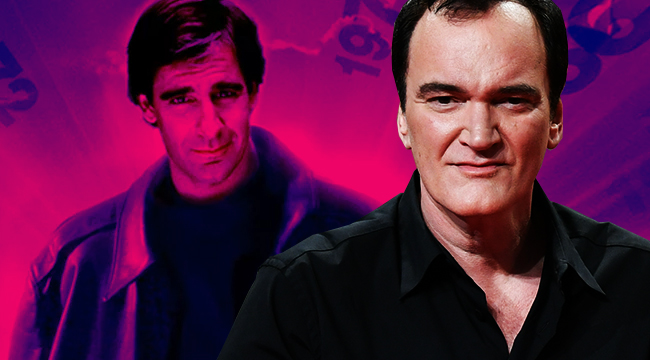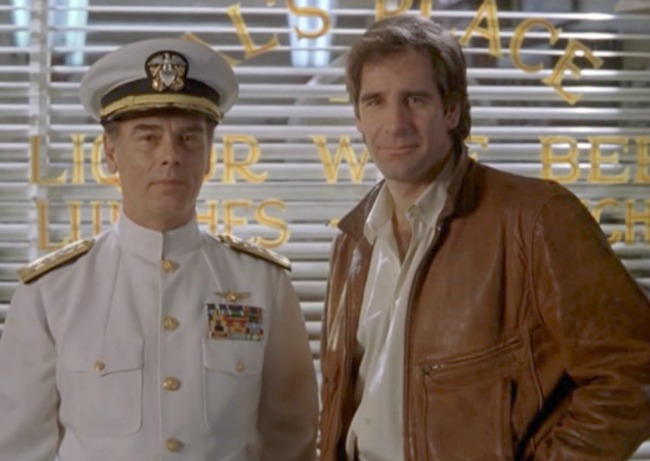
Interest never ebbs when it comes to what Quentin Tarantino is going to do next. Even when we have fresh work to digest. Is he inching closer to retirement? Is Kill Bill 3 on the horizon? Will he put his mark on the Star Trek franchise? Will he go deeper into the world of Once Upon A Time In… Hollywood and develop a Bounty Law TV show? All seem like possibilities following his recent press tour, but the next thing could also be something completely free from our collective radar. Like, say, a Quantum Leap reboot, which is something born from hope (and maybe logic) and not evidence. At all. And yet, still, I sense that 50% of you are already on board just from reading those words. For the stragglers (or folks who don’t know what Quantum Leap is), however, I’ll make my case.
By the way, this should go without saying but you should stop reading if you haven’t seen Once Upon A Time In… Hollywood. I’m about to talk about how, as he did in the theater scene with the Nazis and Adolf Hitler in Inglorious Basterds, Tarantino fictionalized the righting of a wrong by an asleep-at-the-wheel universe in Once by violently neutralizing some of history’s greatest monsters (the Manson Family). This, of course, saved Sharon Tate (Margot Robbie) while mixing fire with sheer brutality and an assist from a very good girl. (A very good girl.) Some will question the level of violence (specifically against the female murderers) or the stepping into real historical events for laughs and art, but you can’t deny that scenes like the ones in question make a mark. They’re also now as signature a Tarantino move as blood spurts, bare feet, ’70s deep cuts, and sharp dialogue.
Let’s file Django Unchained in the same column as Basterds and Once Upon A Time. The handily dealt-with villains like Calvin Candie and his house slave, Stephen, are conjured, not directly pulled from history, but there’s an obvious connection between their on-screen villainy and the evils committed by real-world slavers. Which means there’s that same sense of catharsis when we see Django’s explosive triumph as there is when Hitler and the Manson Family get roasted/pummeled. And that’s to say nothing of other Tarantino works that ride on the rails of revenge fantasy, like Kill Bill/Kill Bill 2 and Death Proof, where bad people who did bad things eventually have bad things happen to them. Just like mama said they would.
Quantum Leap isn’t about catharsis or watching bad people get theirs. [briefly adopts Billy Eichner shout-voice] It’s a nice show! Wrongs are righted as our hero (Dr. Sam Beckett with frequent assists from his hologram sidekick, Al) bounces through time and into people’s lives, but those stories never include the giddy violence that comes with Tarantino’s stabs at fictionalized justice. Quantum Leap is about micro acts of heroism by an “aw shucks” semi-altruist who, while eager to go home, clearly cares about right vs wrong, good vs evil, and the people whose lives he’s affecting as a part of a mysterious plan set in motion by some kind of higher power. Tarantino films, on the other hand, are filled with flawed characters that often exist on the periphery of history and stand in the way of villainy by way of happenstance, righteous anger, and/or revenge.

If it sounds like I’m talking myself and, by extension, you, out of this admittedly crackpot idea of a Tarantino Quantum Leap reboot after building it up with the mere whisper of a mention, then I apologize. Quantum Leap, as beloved a cult confection as it is (and I, having grown up watching it, really do love it), wouldn’t fit in this era and really would need the kind of radical reinvention that Tarantino would bring to it while also allowing him to scratch the Bounty Law and Star Trek itches by doing a TV show within the sci-fi genre. I know. This is a hell of a sales pitch. But I’ll go on.
Quantum Leap had the whole of Sam Beckett’s timeline to explore as he leaped from person to person (and also one time, a chimp), but the show mostly avoided the ’70s, ’80s, and ’90s and played in the ’50s and ’60s; a product of the natural nostalgia cycle (wherein pop culture makers obsess over the events and items from 20-30 years ago as a means of dealing with aging and mortality) of 1989, when the show premiered. As such, Quantum Leap is also driven by a kind of guilt that squares with the existential dread of middle class and opulent Baby Boomers. That generation realized that the promise of the ’60s got derailed and that, in a blink, they wound up in the confined comfort of the ’80s, unable or unwilling to feel the same pull toward fighting injustice that they had in their youth. And in Sam Beckett, they found an innocuous avenging angel and a kind of low-level absolution. (And now I trail off and write 1,000 words connecting Sam Beckett to Bill Clinton’s successful candidacy in 1992 — a year before Quantum Leap went off the air — where he positioned himself as another “aw shucks” type who wanted to right wrongs and assuage Baby Boomer guilt. Or maybe, just maybe, I do not do this.)
Getting back to the point: Imagine a Quantum Leap still stuck in the ’50s and ’60s (where Tarantino’s aesthetic shines brightest) absent Baby Boomer guilt, helmed by a kid of the era who is blameless for its failings and just wants to play with its toys and the arc of history while feeding our base need to see history’s bad guys get punched in the face. (If you take out 98% of the violence, leaving boardroom fisticuffs and a lawnmower massacre, it almost sounds like Mad Men.)
In the bloom of the kind of fantasy where bad guys don’t always win, we might find a measure of solace and that previously mentioned catharsis, but it wouldn’t get us drunk or distract. That’s sort of the genius of Tarantino’s penchant for over the top theatrical violence toward dictators, slavers, and viscous murderers — it’s fun to watch but so detached from reality that it doesn’t register as anything other than a quick and harmless daydream about a more simplified kind of justice. Something that is maybe additive to our trudge through the world as we try to reckon with corruption and injustice in more practical (and non-violent) ways.
Also, I am really passionate about wanting to see Sam Jackson play Al.






